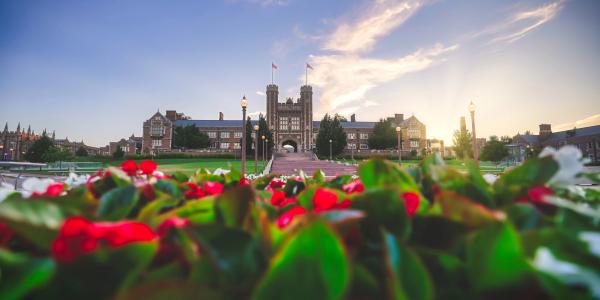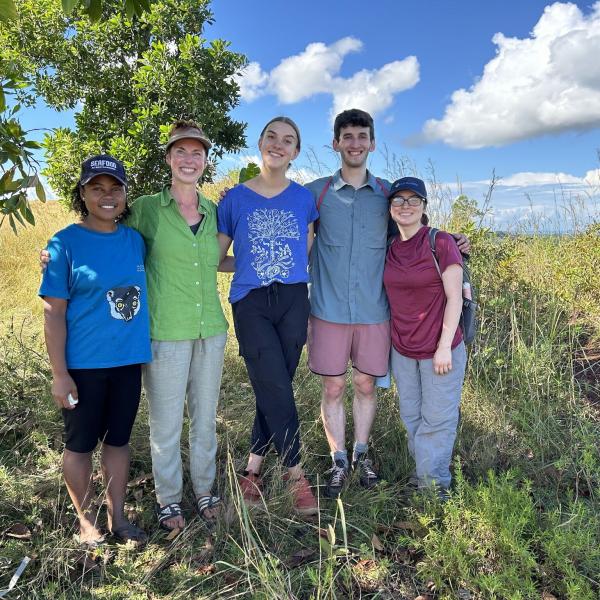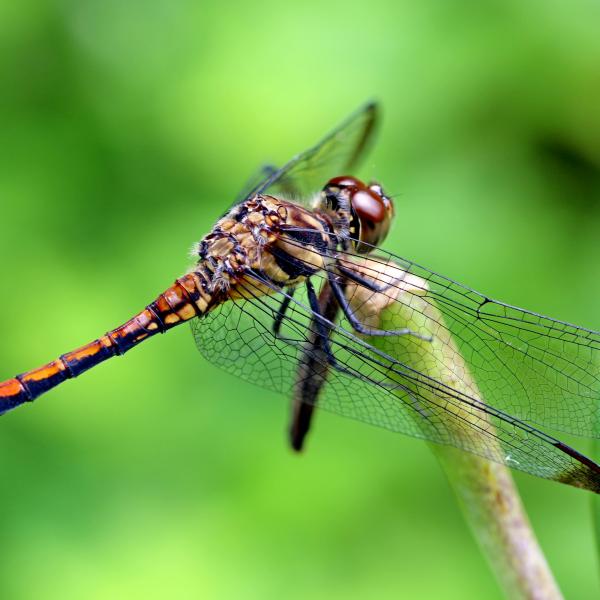Join us in recognizing the achievements and memories of faculty members who are closing out their careers in Arts & Sciences.

John Bowen
Department of Anthropology
Much has changed since John Bowen joined the Department of Anthropology as an assistant professor in the fall of 1985. The last four decades have seen robust growth for the university and significant progress for the department.
Looking back, the Dunbar-Van Cleve Professor in Arts & Sciences appreciates the department’s longstanding commitment to research and graduate training in physical, sociocultural, and archaeological anthropology. “This breadth gives us strong links across the university,” he said. “It also means our graduates have the intellectual resources to teach a broad array of courses.”
For many years, Bowen enjoyed teaching incoming graduate students in all three subfields in the department’s anchor course, “Social Theory and Anthropology.”
A fellow of the American Academy of Arts and Sciences, Bowen carried out long-term field research in Indonesia on Islam, law, and politics. He also developed research sites in France, Great Britain, and the Netherlands. Bowen spent much of his career building international collaborations. As coordinator of the Trans-Atlantic Forum, he enabled graduate students from Amsterdam, Paris, and the U.S. to study in all three countries. Through the McDonnell International Scholars Academy, he returned to Indonesia to help train a new generation of social scientists.
In retirement, he looks forward to writing and visiting family.

Anders E. Carlsson
Department of Physics
Since joining the Department of Physics in 1983, Professor Anders Carlsson has seen the department and the university gain significant momentum. “WashU has become much more of a national and international university with a broader reach,” he said.
Carlsson enjoyed the congeniality of the physics department and the wider WashU community. “People from all branches of physics often get together for lunch and other informal interactions, and I have had rewarding collaborations with other departments including cell biology, biology, and mechanical engineering,” he said. “It was also great to be able to play pickup soccer with students and faculty for many years.”
Carlsson’s favorite course to teach was “Nonlinear Dynamics.” In physics, complex behaviors can result from simple systems of equations. “I always enjoy seeing students react to this,” he said. “The students in this class have been great about learning on their own and sharing their findings with the class.”
In retirement, he plans to do more sailing on Lake Michigan. He also intends to take his piano playing up one or two notches and do more hiking and biking around St. Louis.
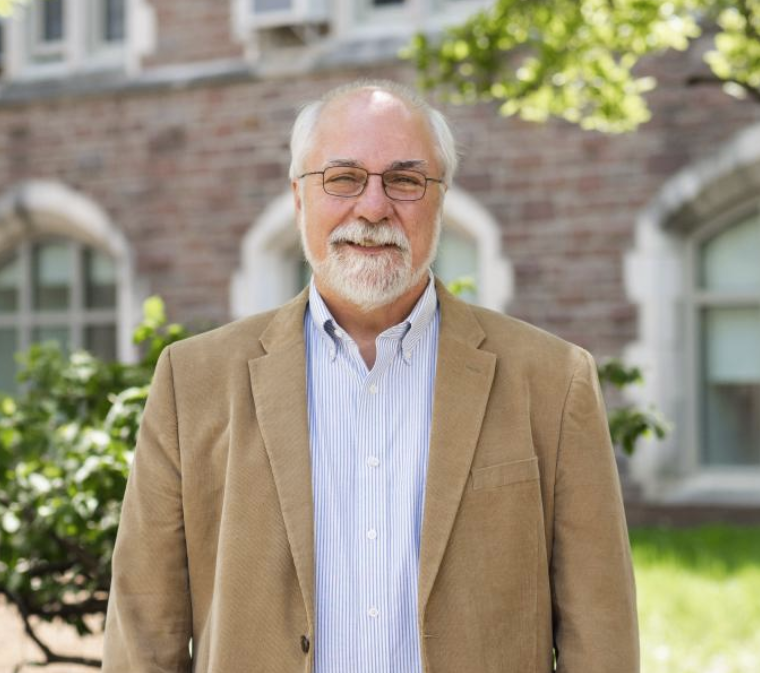
Kenneth F. Kelton
Department of Physics
Ken Kelton didn’t know how long he would stay when he joined the Department of Physics in 1985. “Over the years, I’ve had chances to join other universities but the opportunities at WashU were always too good to pass up,” he said.
Over nearly four decades, the Arthur Holly Compton Professor of Physics witnessed remarkable growth in the department, which he chaired from 2007 to 2012. The focus expanded from traditional physics to cutting-edge topics such as materials physics, biophysics, quantum materials, and quantum sensing. “I look forward to watching from the sidelines to see what new areas develop,” he said.
As the department expanded its research programs, Kelton helped ensure its commitment to education and training remained strong. “I have particularly enjoyed working with undergraduate and graduate students in my lab,” he said. As an educator, he enjoyed teaching introductory physics courses. He also designed an upper-level course on thermodynamics and kinetics (Physics 537) that eventually morphed into a core course for the Institute of Materials Science & Engineering, where he was the inaugural director from 2013 to 2016.
In retirement, he looks forward to traveling with his wife and engaging in hobbies, especially woodworking.

Marvin Marcus
Department of East Asian Languages and Cultures and Program in Comparative Literature
Reflecting on nearly 40 years of teaching at WashU, Professor Marvin Marcus said he’s grown in tandem with the university. When he started in 1985, there was no Department of East Asian Languages and Cultures, only a Department of Chinese and Japanese.
Marcus’s teaching and research have centered on the personal writings of major Japanese figures in the prewar “kindai” period, including memoirs, reminiscences, essays, autobiographies, and diaries. Throughout his career, he also became increasingly drawn to Japanese poetry.
Many of his favorite moments at WashU have been personal, such as the graduation of his son Danny in 2006. And he’s grateful he could dovetail his university career with that of his wife Ginger Marcus, who headed the Japanese language program for many years.
“It’s been a privilege and a pleasure to serve on the faculty — to teach such fine students, both undergraduate and graduate — and to work with colleagues whom I both admire and consider friends,” Marcus said.
While retirement will be a major change, Marcus said he looks forward to completing a book project, pursuing creative writing and photography, and enjoying his “wonderful family.”

Henry I. Schvey
Performing Arts Department
Over the past 37 years, the perception of WashU’s Performing Arts Department and the artist-professors who teach there has changed for the better, according to Henry Schvey. The professor of drama and comparative literature believes he’s helped contribute to this evolution.
When Schvey first arrived at WashU in 1987, professors in the Performing Arts Department were called artists-in-residence. Now they are professors of practice. “The university administration realizes that there are more and different ways of providing information and doing research than writing papers and books,” Schvey said. “Information conveyed non-verbally (dance, performance) through the expressive body is just as valuable.”
Still, Schvey published extensively on modern European, British, and American drama. His most significant writings were on contemporary American playwrights and the Austrian expressionist Oskar Kokoschka, whom he got to know in the 1970s. Over the years, he taught numerous classes on everything from Shakespeare to Tennessee Williams to the theater of ancient Greece.
In 1990, Schvey started the Globe Theater summer program, making WashU the first American university to establish an affiliation with the newly rebuilt theater in London. He also hosted numerous conferences (Eugene O’Neill, Tennessee Williams, Ernest Hemingway, Soviet Theatre) and special performances on campus, including the world premiere of a play penned by Tennessee Williams during his time at WashU and a staging of A.E. Hotchner’s “Cafe Universe.”
He’s also enjoyed “unforgettable, lifelong” friendships with students and colleagues in the Performing Arts Department.
Schvey has yet to decide on the next chapter of his career. “I’m hoping it will be just as stimulating as this one."

Michael Sherberg
Department of Romance Languages and Literatures
Professor Michael Sherberg has seen the Department of Romance Languages and Literatures — and the university as a whole — grow immensely since he started in 1985. Over time, WashU added Italian as an undergraduate major and the entire campus grew with more buildings and students.
Sherberg’s research areas included Italian literature from the Middle Ages and Renaissance, as well as Italian children’s literature. He counts himself fortunate to have been involved in the development of the Interdisciplinary Project in the Humanities, which helped him grow as a scholar, opened up avenues for collaboration, and connected him to outstanding students.
His favorite memories, however, are those of students who saw him as someone worthy of their trust. “I have powerful memories of the teachers in my youth who often understood me better than I did myself and helped me out in tough moments,” he said. “I am enormously grateful to those people and wanted to pay it forward to students who needed a similar hand.”
In retirement, Sherberg plans to finish up a major translation, dig into research, and play more bridge —“perhaps the best card game ever invented.”

Rebecca Treiman
Department of Psychological & Brain Sciences
Since joining the Department of Psychological & Brain Sciences in 2002, Rebecca Treiman has been a prolific researcher and author specializing in the psychology of reading and spelling.
Her accolades have included a Distinguished Scientific Contributions Award from the Society for the Scientific Study of Reading and a fellowship from the Association of Psychological Science. She has authored two books — “Beginning to Spell: A Study of First-Grade Children” and “How Children Learn to Write Words” — and over 200 scientific articles.
After more than two decades at WashU, the Burke & Elizabeth High Baker Professor of Child Development in Arts & Sciences said she’s thankful for the space she’s had to build her career. “I like the freedom to follow one's own direction in research and teaching,” she said. “I also appreciate the high quality of faculty, students, and staff.”
While Treiman has taught many classes, the undergraduate course “Language Acquisition” stands out. “The course attracts students with different interests in language, ranging from the philosophical to the practical,” she said.
In retirement, she looks forward to traveling at non-peak times and to practicing Spanish and French. She will also take advantage of the time to complete some research studies.
James Wertsch
Department of Anthropology

When James Wertsch began his WashU career in 1995 as chair of the Department of Education, he wasted no time sharing his expertise across Arts & Sciences. He went on to teach in several departments and programs, including anthropology, psychological and brain sciences, education, and global studies.
In 2005, Wertsch became the founding director of the McDonnell International Scholars Academy, an initiative designed to position WashU as the anchor of a global community of universities.
“At the time, there was no other institution in the U.S. that had this kind of program,” said Wertsch, the David R. Francis Distinguished Professor. “The idea was to bring young people from different disciplines and parts of the world together for cohort experiences. They would travel together, think together, educate each other, and expand their horizons.”
For Wertsch, leading the McDonnell Scholars program was a natural extension of his academic work, which consistently emphasized the importance of interdisciplinary, international collaborations.
In retirement, Wertsch plans to continue to work on an international project about collective memory and national narratives. He will move to Washington, D.C., to collaborate with think tanks on various projects and, most importantly, to spend time with his grandchildren.
Read more in Ampersand magazine.

Gerhild Williams
Department of Germanic Languages and Literatures
Gerhild Williams has experienced firsthand the importance of nurturing WashU’s community spirit. “The people that surround you always have plans and dreams,” she said. “You participate in theirs and they participate in yours. It's always a give and take.”
Throughout her 48-year career at WashU, Williams sought to support the university community as vice provost, associate vice chancellor for academic affairs, and chair of the Department of Germanic Languages and Literatures.
“I never wanted to leave WashU. It was the perfect place for me,” she said. “Our German department was, and still is, one of the best in the nation, so I always had excellent colleagues and students.”
As a scholar, Williams was interested in the historical impact of cross-cultural communications. She began her career as a medievalist, tracing how poetry crossed the Mediterranean to Spain, France, Germany, and England. She published on the early modern witch phenomenon and, most recently, the 17th-century novel.
In retirement, Williams plans to finish transcribing a three-volume collection of tales by the 17th-century writer Erasmus Francisci. She looks forward to remaining connected to friends and family in St. Louis, traveling and hiking through Germany with her brothers, and cross-country skiing in Sweden.
Read more in Ampersand magazine.
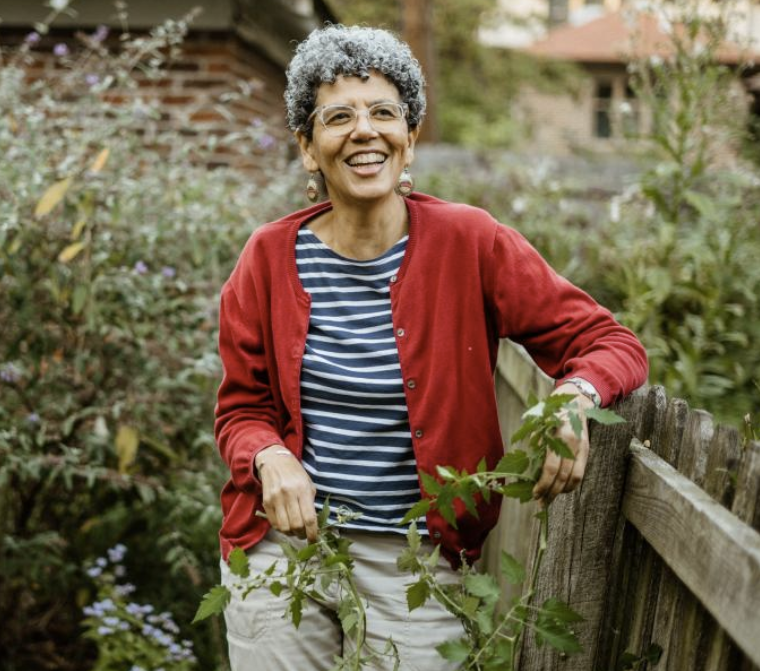
Rafia Zafar
Departments of English, African and African American Studies, and American Culture Studies
When Professor Rafia Zafar retires, she will hand over the title of longest-serving Black woman faculty member in Arts & Sciences.
Zafar came to WashU in 1998 and was delighted by the smaller size of the university. It allowed her to meet and befriend faculty from different divisions, and the class sizes meant she could get to know her students. She taught a variety of courses over the years, but the three she taught most regularly were “Black Women Writers,” “Topics in African-American Literature: Rebels, Sheroes, and Race Men,” and “Recipes for Respect: Black Foodways in the United States.” She also held numerous administrative roles at the university.
“Being faculty director of the Mellon Mays Undergraduate Fellowship, director of the Chancellor’s Graduate Fellowship, and associate dean of diversity and inclusion in the Graduate School of Arts & Sciences allowed me to expand my ability to mentor, one of my favorite things to do as a professor,” she said. She counts these roles as key to her university contributions.
Though it’s the twilight of her career as a professor, she’s not slowing down. This spring she spent time in Italy teaching a mini-seminar on Black foodways at the University of Gastronomic Sciences. Next, she’ll be in Finland at Åbo Akademi University, where she’ll teach African American literature as a Donner visiting professor.
In retirement, she looks forward to moving back to New York City, spending time with her high school friends, working on writing projects, and reading.
